Analyzing Risk Strategies in the Nigerian Petroleum Industry
VerifiedAdded on 2023/01/06
|44
|13704
|4
Dissertation
AI Summary
This dissertation examines risk management strategies within Nigeria's petroleum industry, focusing on the effects of political instability. The research employs a qualitative study, utilizing primary data collected through questionnaires to address key research questions. The study highlights the significant political risks associated with managing natural resources in the oil and gas sector, emphasizing the impact of governmental instability. The dissertation interprets the need for enhanced oil recovery to boost productivity and advocates for the implementation of risk management structures within large oil and gas companies to improve performance. The findings provide recommendations for senior management, drawing from a comprehensive literature review and data analysis. The research also covers the background of the research topic and organization, research rationale, research questions, aims and objectives, literature review, methodology, findings, and conclusions.
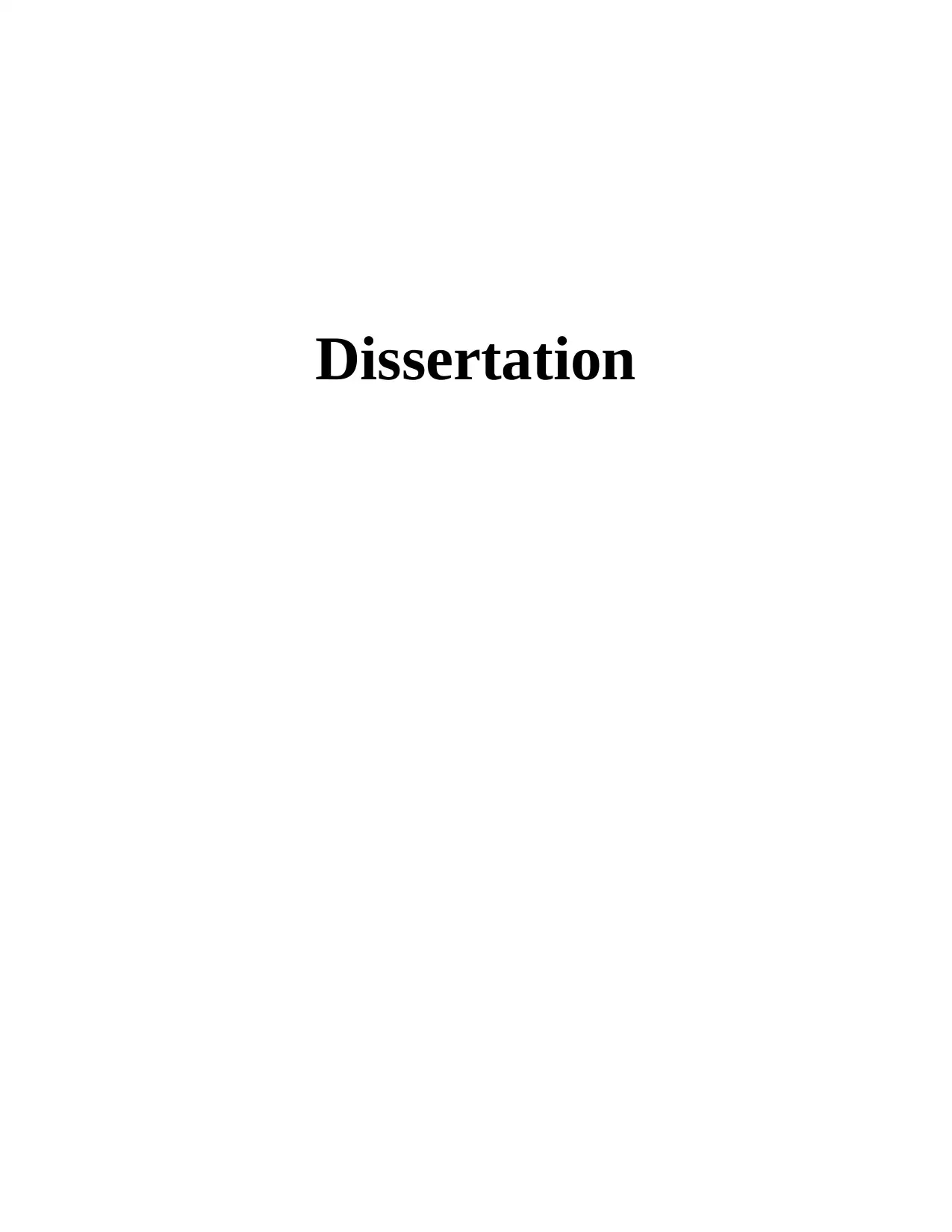
Dissertation
Paraphrase This Document
Need a fresh take? Get an instant paraphrase of this document with our AI Paraphraser
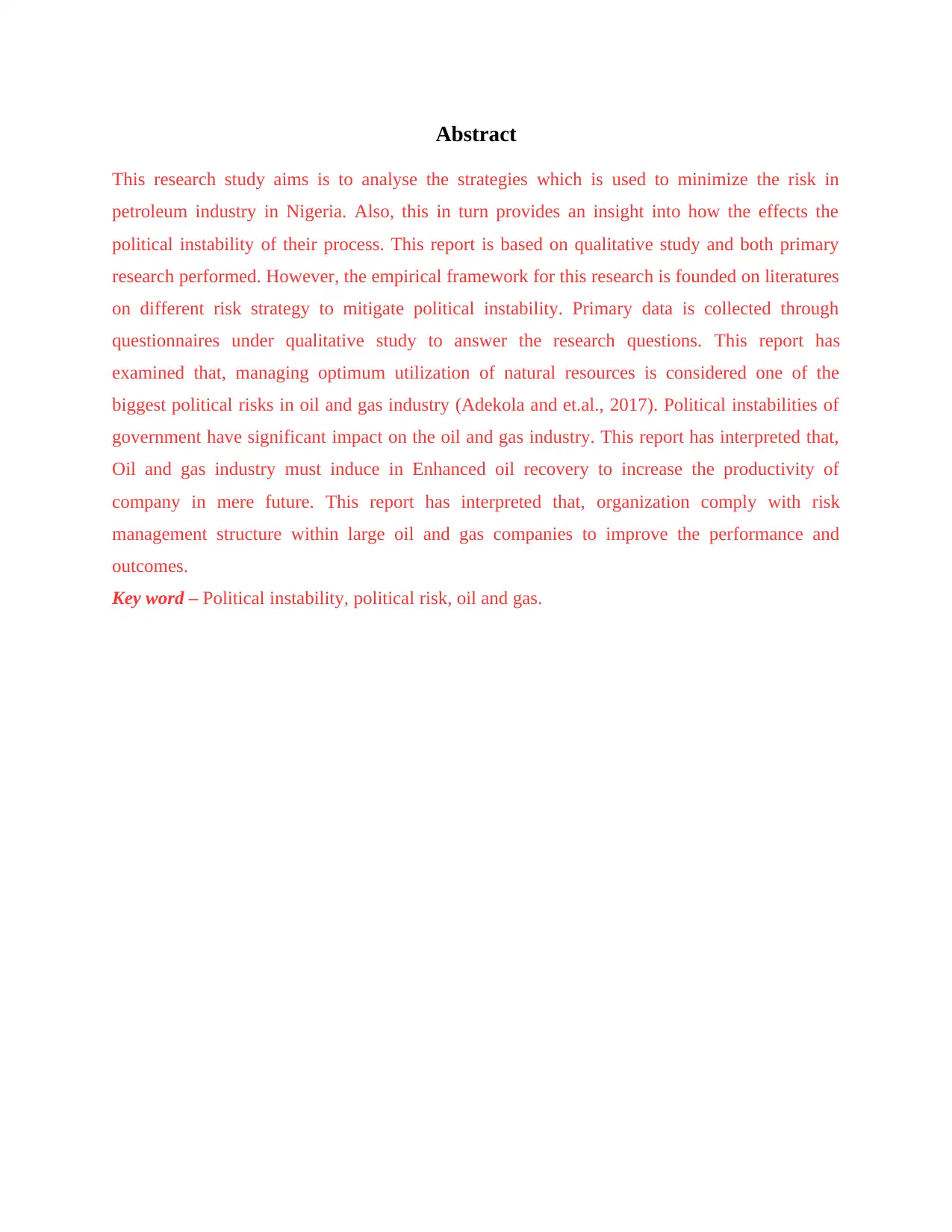
Abstract
This research study aims is to analyse the strategies which is used to minimize the risk in
petroleum industry in Nigeria. Also, this in turn provides an insight into how the effects the
political instability of their process. This report is based on qualitative study and both primary
research performed. However, the empirical framework for this research is founded on literatures
on different risk strategy to mitigate political instability. Primary data is collected through
questionnaires under qualitative study to answer the research questions. This report has
examined that, managing optimum utilization of natural resources is considered one of the
biggest political risks in oil and gas industry (Adekola and et.al., 2017). Political instabilities of
government have significant impact on the oil and gas industry. This report has interpreted that,
Oil and gas industry must induce in Enhanced oil recovery to increase the productivity of
company in mere future. This report has interpreted that, organization comply with risk
management structure within large oil and gas companies to improve the performance and
outcomes.
Key word – Political instability, political risk, oil and gas.
This research study aims is to analyse the strategies which is used to minimize the risk in
petroleum industry in Nigeria. Also, this in turn provides an insight into how the effects the
political instability of their process. This report is based on qualitative study and both primary
research performed. However, the empirical framework for this research is founded on literatures
on different risk strategy to mitigate political instability. Primary data is collected through
questionnaires under qualitative study to answer the research questions. This report has
examined that, managing optimum utilization of natural resources is considered one of the
biggest political risks in oil and gas industry (Adekola and et.al., 2017). Political instabilities of
government have significant impact on the oil and gas industry. This report has interpreted that,
Oil and gas industry must induce in Enhanced oil recovery to increase the productivity of
company in mere future. This report has interpreted that, organization comply with risk
management structure within large oil and gas companies to improve the performance and
outcomes.
Key word – Political instability, political risk, oil and gas.
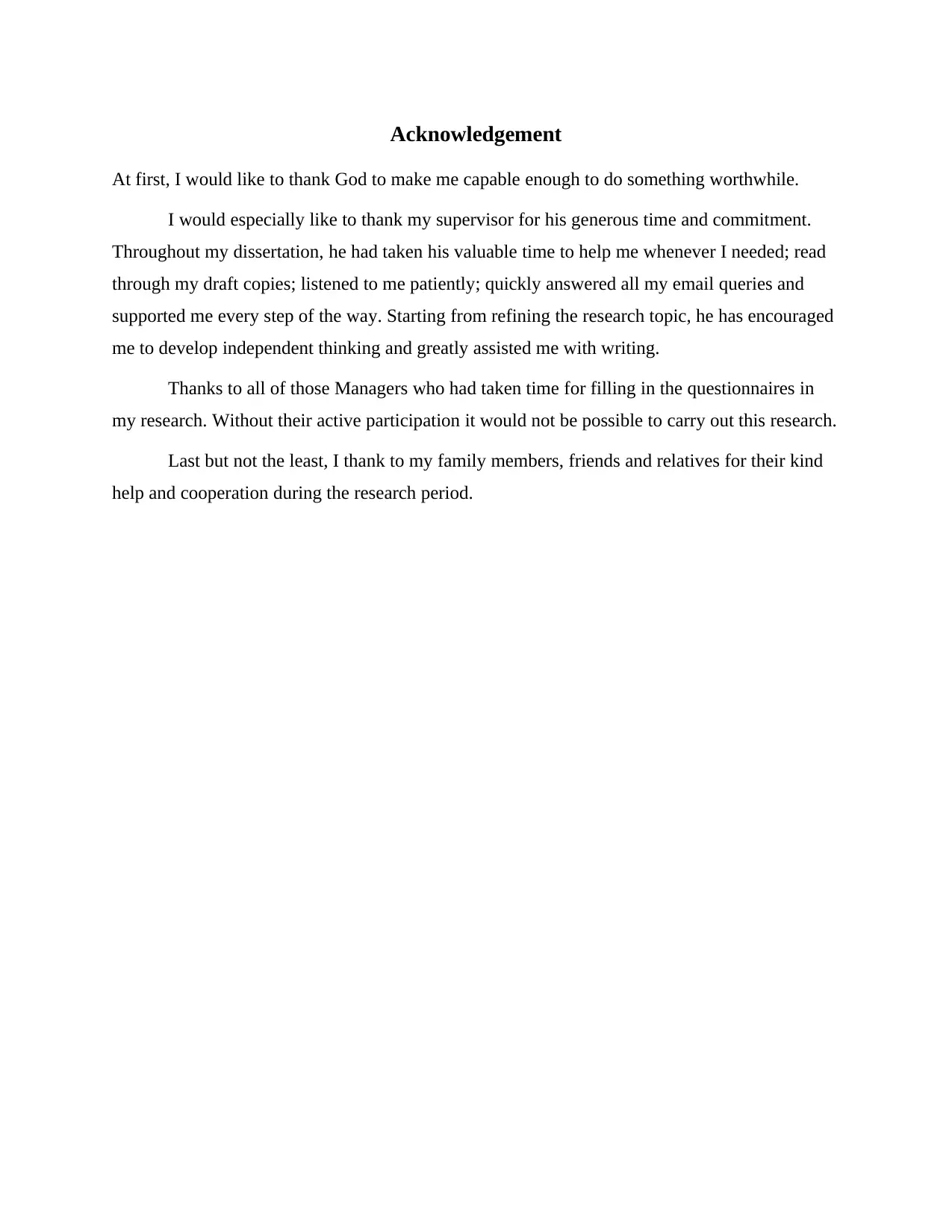
Acknowledgement
At first, I would like to thank God to make me capable enough to do something worthwhile.
I would especially like to thank my supervisor for his generous time and commitment.
Throughout my dissertation, he had taken his valuable time to help me whenever I needed; read
through my draft copies; listened to me patiently; quickly answered all my email queries and
supported me every step of the way. Starting from refining the research topic, he has encouraged
me to develop independent thinking and greatly assisted me with writing.
Thanks to all of those Managers who had taken time for filling in the questionnaires in
my research. Without their active participation it would not be possible to carry out this research.
Last but not the least, I thank to my family members, friends and relatives for their kind
help and cooperation during the research period.
At first, I would like to thank God to make me capable enough to do something worthwhile.
I would especially like to thank my supervisor for his generous time and commitment.
Throughout my dissertation, he had taken his valuable time to help me whenever I needed; read
through my draft copies; listened to me patiently; quickly answered all my email queries and
supported me every step of the way. Starting from refining the research topic, he has encouraged
me to develop independent thinking and greatly assisted me with writing.
Thanks to all of those Managers who had taken time for filling in the questionnaires in
my research. Without their active participation it would not be possible to carry out this research.
Last but not the least, I thank to my family members, friends and relatives for their kind
help and cooperation during the research period.
⊘ This is a preview!⊘
Do you want full access?
Subscribe today to unlock all pages.

Trusted by 1+ million students worldwide
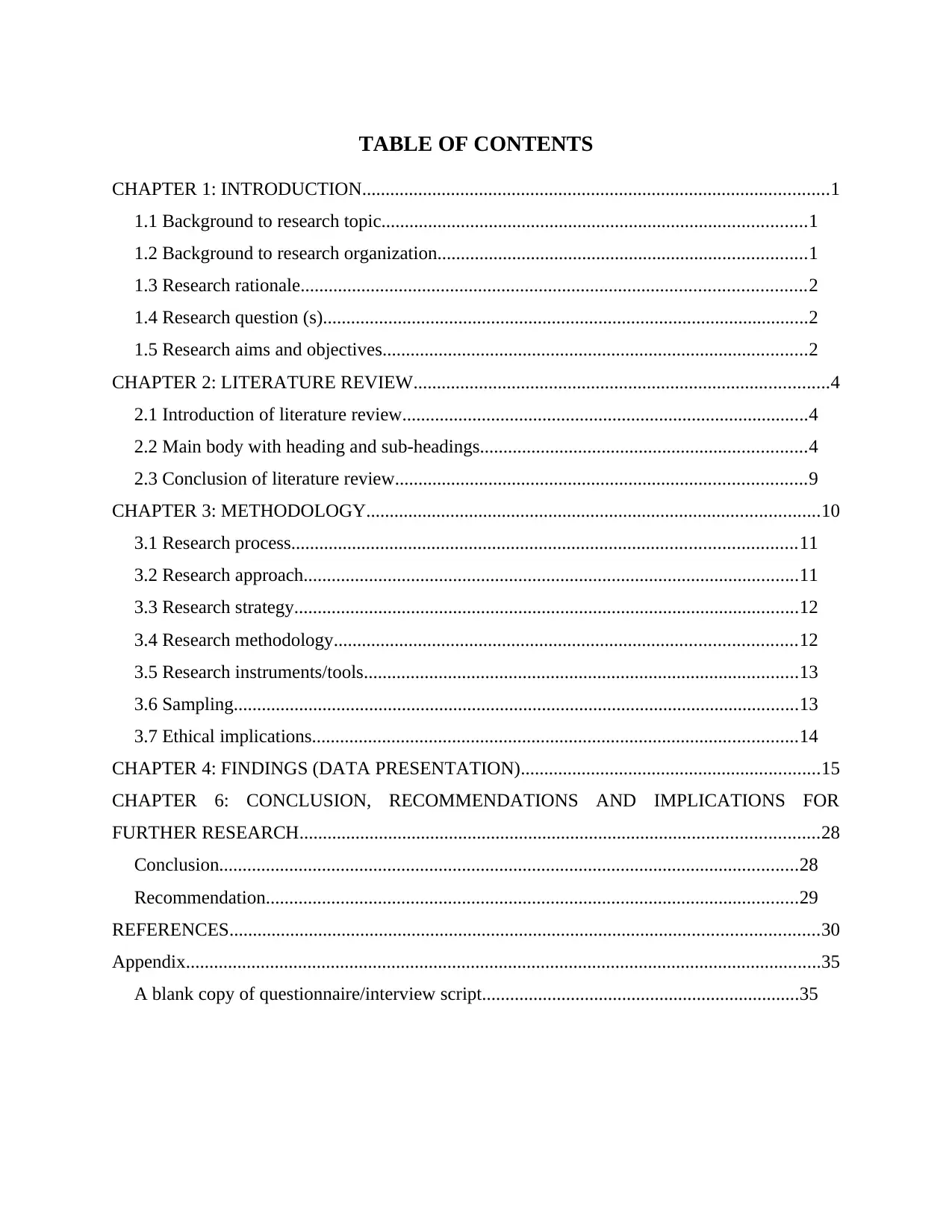
TABLE OF CONTENTS
CHAPTER 1: INTRODUCTION....................................................................................................1
1.1 Background to research topic...........................................................................................1
1.2 Background to research organization...............................................................................1
1.3 Research rationale............................................................................................................2
1.4 Research question (s)........................................................................................................2
1.5 Research aims and objectives...........................................................................................2
CHAPTER 2: LITERATURE REVIEW.........................................................................................4
2.1 Introduction of literature review.......................................................................................4
2.2 Main body with heading and sub-headings......................................................................4
2.3 Conclusion of literature review........................................................................................9
CHAPTER 3: METHODOLOGY.................................................................................................10
3.1 Research process............................................................................................................11
3.2 Research approach..........................................................................................................11
3.3 Research strategy............................................................................................................12
3.4 Research methodology...................................................................................................12
3.5 Research instruments/tools.............................................................................................13
3.6 Sampling.........................................................................................................................13
3.7 Ethical implications........................................................................................................14
CHAPTER 4: FINDINGS (DATA PRESENTATION)................................................................15
CHAPTER 6: CONCLUSION, RECOMMENDATIONS AND IMPLICATIONS FOR
FURTHER RESEARCH...............................................................................................................28
Conclusion............................................................................................................................28
Recommendation..................................................................................................................29
REFERENCES..............................................................................................................................30
Appendix........................................................................................................................................35
A blank copy of questionnaire/interview script....................................................................35
CHAPTER 1: INTRODUCTION....................................................................................................1
1.1 Background to research topic...........................................................................................1
1.2 Background to research organization...............................................................................1
1.3 Research rationale............................................................................................................2
1.4 Research question (s)........................................................................................................2
1.5 Research aims and objectives...........................................................................................2
CHAPTER 2: LITERATURE REVIEW.........................................................................................4
2.1 Introduction of literature review.......................................................................................4
2.2 Main body with heading and sub-headings......................................................................4
2.3 Conclusion of literature review........................................................................................9
CHAPTER 3: METHODOLOGY.................................................................................................10
3.1 Research process............................................................................................................11
3.2 Research approach..........................................................................................................11
3.3 Research strategy............................................................................................................12
3.4 Research methodology...................................................................................................12
3.5 Research instruments/tools.............................................................................................13
3.6 Sampling.........................................................................................................................13
3.7 Ethical implications........................................................................................................14
CHAPTER 4: FINDINGS (DATA PRESENTATION)................................................................15
CHAPTER 6: CONCLUSION, RECOMMENDATIONS AND IMPLICATIONS FOR
FURTHER RESEARCH...............................................................................................................28
Conclusion............................................................................................................................28
Recommendation..................................................................................................................29
REFERENCES..............................................................................................................................30
Appendix........................................................................................................................................35
A blank copy of questionnaire/interview script....................................................................35
Paraphrase This Document
Need a fresh take? Get an instant paraphrase of this document with our AI Paraphraser
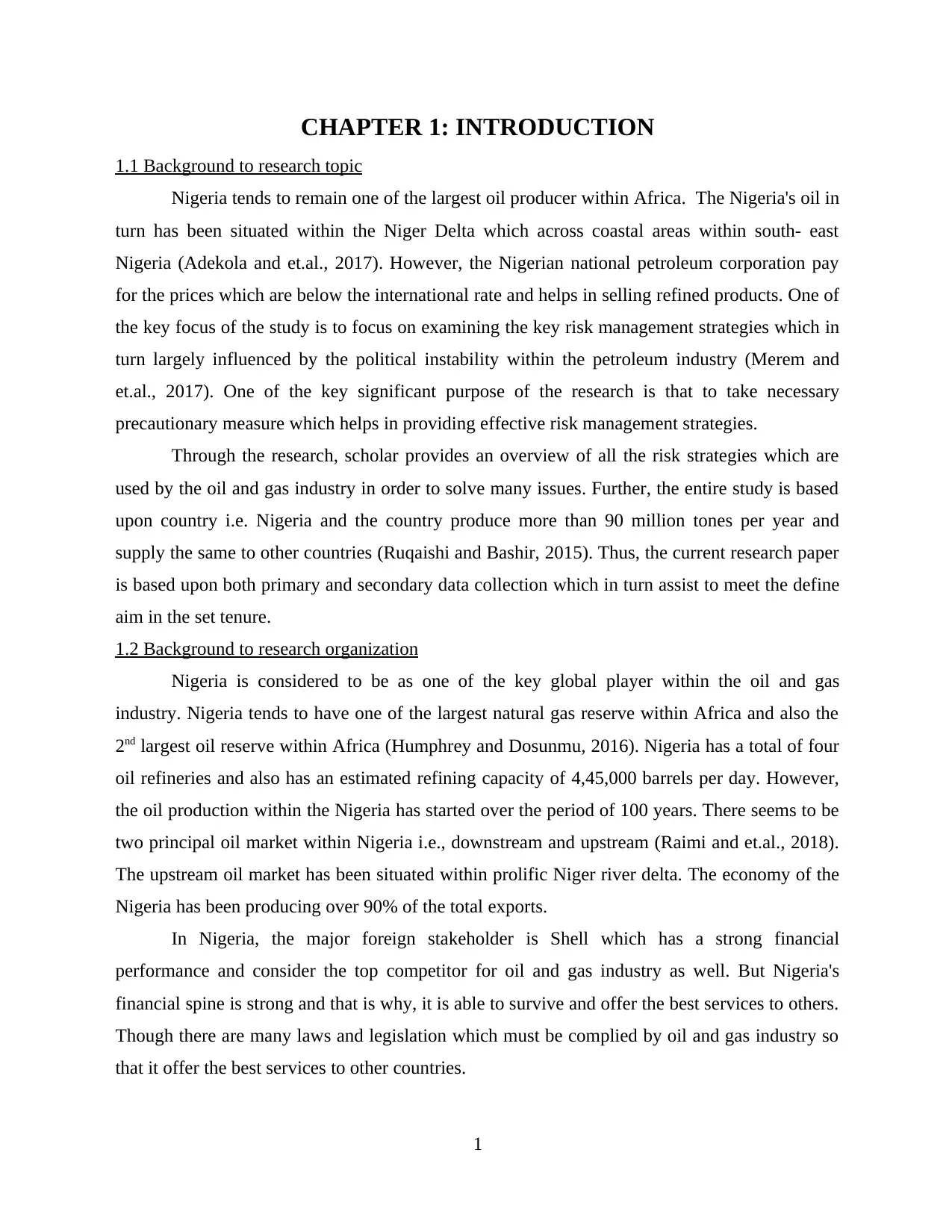
CHAPTER 1: INTRODUCTION
1.1 Background to research topic
Nigeria tends to remain one of the largest oil producer within Africa. The Nigeria's oil in
turn has been situated within the Niger Delta which across coastal areas within south- east
Nigeria (Adekola and et.al., 2017). However, the Nigerian national petroleum corporation pay
for the prices which are below the international rate and helps in selling refined products. One of
the key focus of the study is to focus on examining the key risk management strategies which in
turn largely influenced by the political instability within the petroleum industry (Merem and
et.al., 2017). One of the key significant purpose of the research is that to take necessary
precautionary measure which helps in providing effective risk management strategies.
Through the research, scholar provides an overview of all the risk strategies which are
used by the oil and gas industry in order to solve many issues. Further, the entire study is based
upon country i.e. Nigeria and the country produce more than 90 million tones per year and
supply the same to other countries (Ruqaishi and Bashir, 2015). Thus, the current research paper
is based upon both primary and secondary data collection which in turn assist to meet the define
aim in the set tenure.
1.2 Background to research organization
Nigeria is considered to be as one of the key global player within the oil and gas
industry. Nigeria tends to have one of the largest natural gas reserve within Africa and also the
2nd largest oil reserve within Africa (Humphrey and Dosunmu, 2016). Nigeria has a total of four
oil refineries and also has an estimated refining capacity of 4,45,000 barrels per day. However,
the oil production within the Nigeria has started over the period of 100 years. There seems to be
two principal oil market within Nigeria i.e., downstream and upstream (Raimi and et.al., 2018).
The upstream oil market has been situated within prolific Niger river delta. The economy of the
Nigeria has been producing over 90% of the total exports.
In Nigeria, the major foreign stakeholder is Shell which has a strong financial
performance and consider the top competitor for oil and gas industry as well. But Nigeria's
financial spine is strong and that is why, it is able to survive and offer the best services to others.
Though there are many laws and legislation which must be complied by oil and gas industry so
that it offer the best services to other countries.
1
1.1 Background to research topic
Nigeria tends to remain one of the largest oil producer within Africa. The Nigeria's oil in
turn has been situated within the Niger Delta which across coastal areas within south- east
Nigeria (Adekola and et.al., 2017). However, the Nigerian national petroleum corporation pay
for the prices which are below the international rate and helps in selling refined products. One of
the key focus of the study is to focus on examining the key risk management strategies which in
turn largely influenced by the political instability within the petroleum industry (Merem and
et.al., 2017). One of the key significant purpose of the research is that to take necessary
precautionary measure which helps in providing effective risk management strategies.
Through the research, scholar provides an overview of all the risk strategies which are
used by the oil and gas industry in order to solve many issues. Further, the entire study is based
upon country i.e. Nigeria and the country produce more than 90 million tones per year and
supply the same to other countries (Ruqaishi and Bashir, 2015). Thus, the current research paper
is based upon both primary and secondary data collection which in turn assist to meet the define
aim in the set tenure.
1.2 Background to research organization
Nigeria is considered to be as one of the key global player within the oil and gas
industry. Nigeria tends to have one of the largest natural gas reserve within Africa and also the
2nd largest oil reserve within Africa (Humphrey and Dosunmu, 2016). Nigeria has a total of four
oil refineries and also has an estimated refining capacity of 4,45,000 barrels per day. However,
the oil production within the Nigeria has started over the period of 100 years. There seems to be
two principal oil market within Nigeria i.e., downstream and upstream (Raimi and et.al., 2018).
The upstream oil market has been situated within prolific Niger river delta. The economy of the
Nigeria has been producing over 90% of the total exports.
In Nigeria, the major foreign stakeholder is Shell which has a strong financial
performance and consider the top competitor for oil and gas industry as well. But Nigeria's
financial spine is strong and that is why, it is able to survive and offer the best services to others.
Though there are many laws and legislation which must be complied by oil and gas industry so
that it offer the best services to other countries.
1
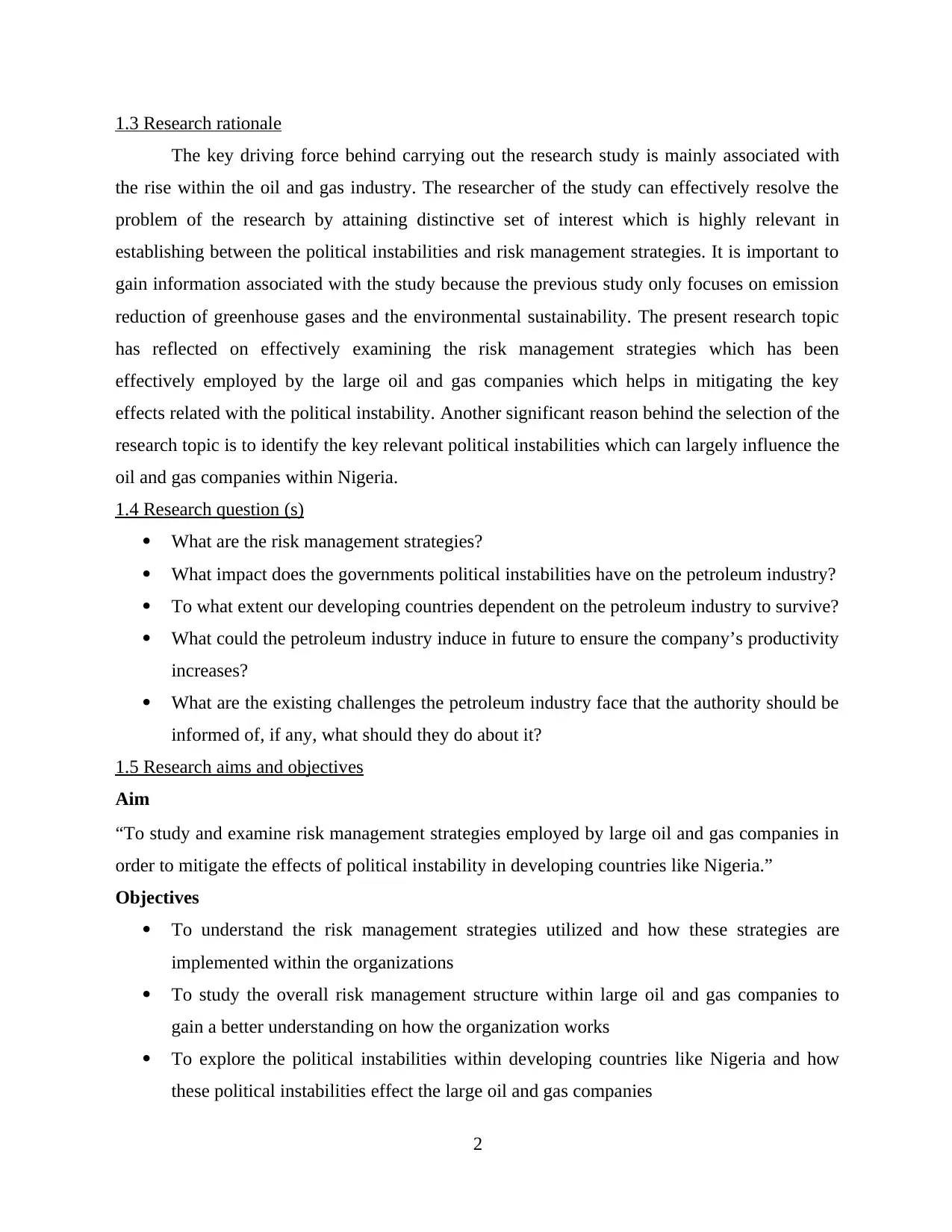
1.3 Research rationale
The key driving force behind carrying out the research study is mainly associated with
the rise within the oil and gas industry. The researcher of the study can effectively resolve the
problem of the research by attaining distinctive set of interest which is highly relevant in
establishing between the political instabilities and risk management strategies. It is important to
gain information associated with the study because the previous study only focuses on emission
reduction of greenhouse gases and the environmental sustainability. The present research topic
has reflected on effectively examining the risk management strategies which has been
effectively employed by the large oil and gas companies which helps in mitigating the key
effects related with the political instability. Another significant reason behind the selection of the
research topic is to identify the key relevant political instabilities which can largely influence the
oil and gas companies within Nigeria.
1.4 Research question (s)
What are the risk management strategies?
What impact does the governments political instabilities have on the petroleum industry?
To what extent our developing countries dependent on the petroleum industry to survive?
What could the petroleum industry induce in future to ensure the company’s productivity
increases?
What are the existing challenges the petroleum industry face that the authority should be
informed of, if any, what should they do about it?
1.5 Research aims and objectives
Aim
“To study and examine risk management strategies employed by large oil and gas companies in
order to mitigate the effects of political instability in developing countries like Nigeria.”
Objectives
To understand the risk management strategies utilized and how these strategies are
implemented within the organizations
To study the overall risk management structure within large oil and gas companies to
gain a better understanding on how the organization works
To explore the political instabilities within developing countries like Nigeria and how
these political instabilities effect the large oil and gas companies
2
The key driving force behind carrying out the research study is mainly associated with
the rise within the oil and gas industry. The researcher of the study can effectively resolve the
problem of the research by attaining distinctive set of interest which is highly relevant in
establishing between the political instabilities and risk management strategies. It is important to
gain information associated with the study because the previous study only focuses on emission
reduction of greenhouse gases and the environmental sustainability. The present research topic
has reflected on effectively examining the risk management strategies which has been
effectively employed by the large oil and gas companies which helps in mitigating the key
effects related with the political instability. Another significant reason behind the selection of the
research topic is to identify the key relevant political instabilities which can largely influence the
oil and gas companies within Nigeria.
1.4 Research question (s)
What are the risk management strategies?
What impact does the governments political instabilities have on the petroleum industry?
To what extent our developing countries dependent on the petroleum industry to survive?
What could the petroleum industry induce in future to ensure the company’s productivity
increases?
What are the existing challenges the petroleum industry face that the authority should be
informed of, if any, what should they do about it?
1.5 Research aims and objectives
Aim
“To study and examine risk management strategies employed by large oil and gas companies in
order to mitigate the effects of political instability in developing countries like Nigeria.”
Objectives
To understand the risk management strategies utilized and how these strategies are
implemented within the organizations
To study the overall risk management structure within large oil and gas companies to
gain a better understanding on how the organization works
To explore the political instabilities within developing countries like Nigeria and how
these political instabilities effect the large oil and gas companies
2
⊘ This is a preview!⊘
Do you want full access?
Subscribe today to unlock all pages.

Trusted by 1+ million students worldwide
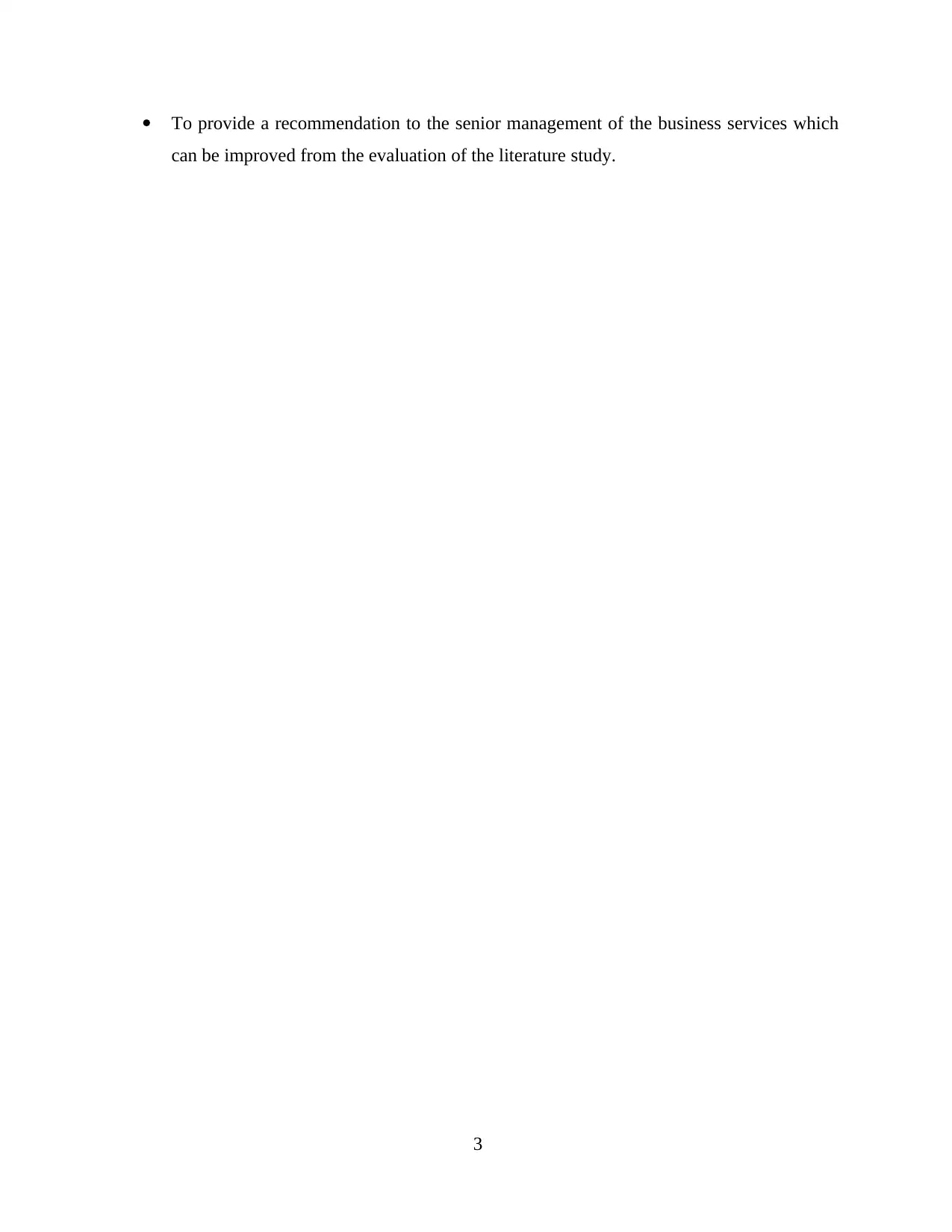
To provide a recommendation to the senior management of the business services which
can be improved from the evaluation of the literature study.
3
can be improved from the evaluation of the literature study.
3
Paraphrase This Document
Need a fresh take? Get an instant paraphrase of this document with our AI Paraphraser
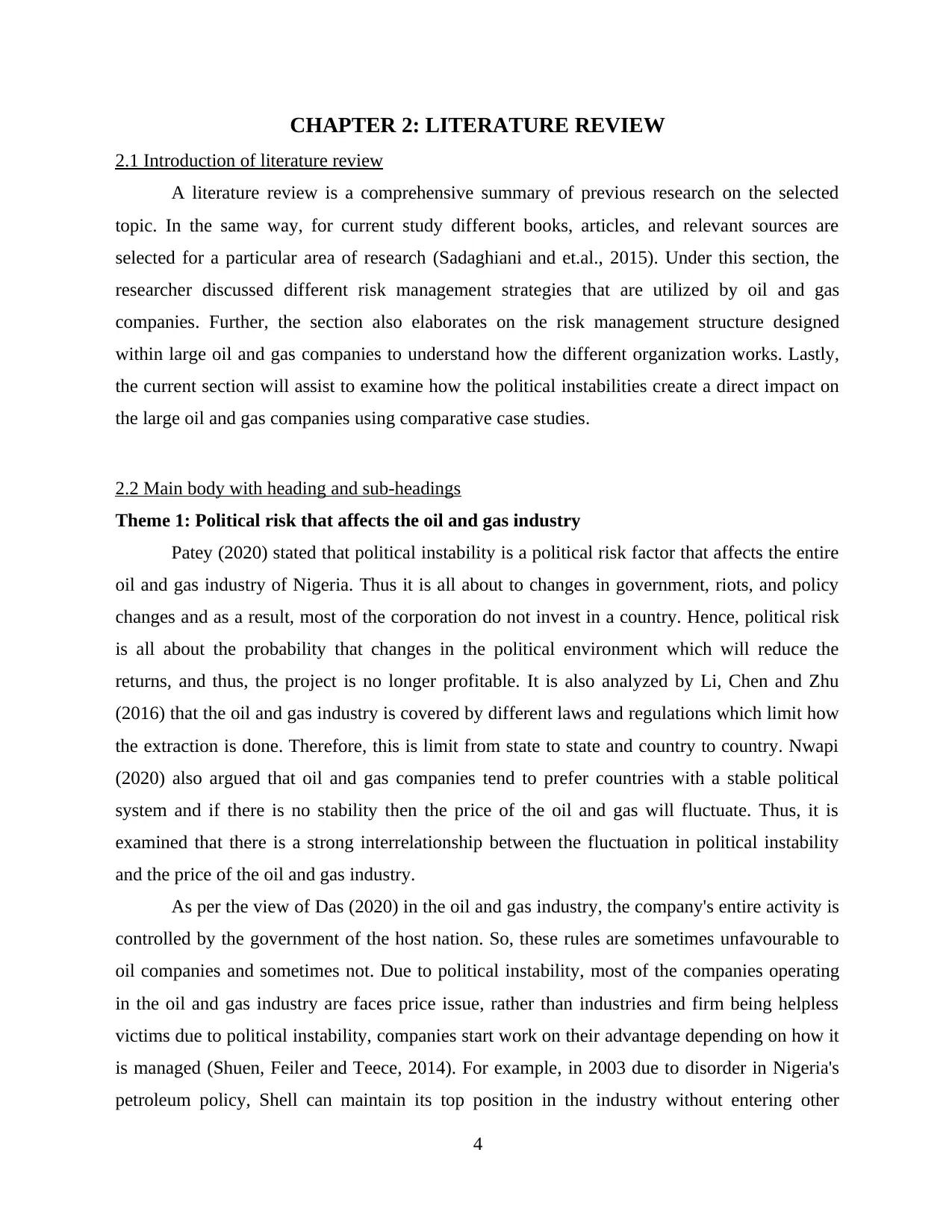
CHAPTER 2: LITERATURE REVIEW
2.1 Introduction of literature review
A literature review is a comprehensive summary of previous research on the selected
topic. In the same way, for current study different books, articles, and relevant sources are
selected for a particular area of research (Sadaghiani and et.al., 2015). Under this section, the
researcher discussed different risk management strategies that are utilized by oil and gas
companies. Further, the section also elaborates on the risk management structure designed
within large oil and gas companies to understand how the different organization works. Lastly,
the current section will assist to examine how the political instabilities create a direct impact on
the large oil and gas companies using comparative case studies.
2.2 Main body with heading and sub-headings
Theme 1: Political risk that affects the oil and gas industry
Patey (2020) stated that political instability is a political risk factor that affects the entire
oil and gas industry of Nigeria. Thus it is all about to changes in government, riots, and policy
changes and as a result, most of the corporation do not invest in a country. Hence, political risk
is all about the probability that changes in the political environment which will reduce the
returns, and thus, the project is no longer profitable. It is also analyzed by Li, Chen and Zhu
(2016) that the oil and gas industry is covered by different laws and regulations which limit how
the extraction is done. Therefore, this is limit from state to state and country to country. Nwapi
(2020) also argued that oil and gas companies tend to prefer countries with a stable political
system and if there is no stability then the price of the oil and gas will fluctuate. Thus, it is
examined that there is a strong interrelationship between the fluctuation in political instability
and the price of the oil and gas industry.
As per the view of Das (2020) in the oil and gas industry, the company's entire activity is
controlled by the government of the host nation. So, these rules are sometimes unfavourable to
oil companies and sometimes not. Due to political instability, most of the companies operating
in the oil and gas industry are faces price issue, rather than industries and firm being helpless
victims due to political instability, companies start work on their advantage depending on how it
is managed (Shuen, Feiler and Teece, 2014). For example, in 2003 due to disorder in Nigeria's
petroleum policy, Shell can maintain its top position in the industry without entering other
4
2.1 Introduction of literature review
A literature review is a comprehensive summary of previous research on the selected
topic. In the same way, for current study different books, articles, and relevant sources are
selected for a particular area of research (Sadaghiani and et.al., 2015). Under this section, the
researcher discussed different risk management strategies that are utilized by oil and gas
companies. Further, the section also elaborates on the risk management structure designed
within large oil and gas companies to understand how the different organization works. Lastly,
the current section will assist to examine how the political instabilities create a direct impact on
the large oil and gas companies using comparative case studies.
2.2 Main body with heading and sub-headings
Theme 1: Political risk that affects the oil and gas industry
Patey (2020) stated that political instability is a political risk factor that affects the entire
oil and gas industry of Nigeria. Thus it is all about to changes in government, riots, and policy
changes and as a result, most of the corporation do not invest in a country. Hence, political risk
is all about the probability that changes in the political environment which will reduce the
returns, and thus, the project is no longer profitable. It is also analyzed by Li, Chen and Zhu
(2016) that the oil and gas industry is covered by different laws and regulations which limit how
the extraction is done. Therefore, this is limit from state to state and country to country. Nwapi
(2020) also argued that oil and gas companies tend to prefer countries with a stable political
system and if there is no stability then the price of the oil and gas will fluctuate. Thus, it is
examined that there is a strong interrelationship between the fluctuation in political instability
and the price of the oil and gas industry.
As per the view of Das (2020) in the oil and gas industry, the company's entire activity is
controlled by the government of the host nation. So, these rules are sometimes unfavourable to
oil companies and sometimes not. Due to political instability, most of the companies operating
in the oil and gas industry are faces price issue, rather than industries and firm being helpless
victims due to political instability, companies start work on their advantage depending on how it
is managed (Shuen, Feiler and Teece, 2014). For example, in 2003 due to disorder in Nigeria's
petroleum policy, Shell can maintain its top position in the industry without entering other
4
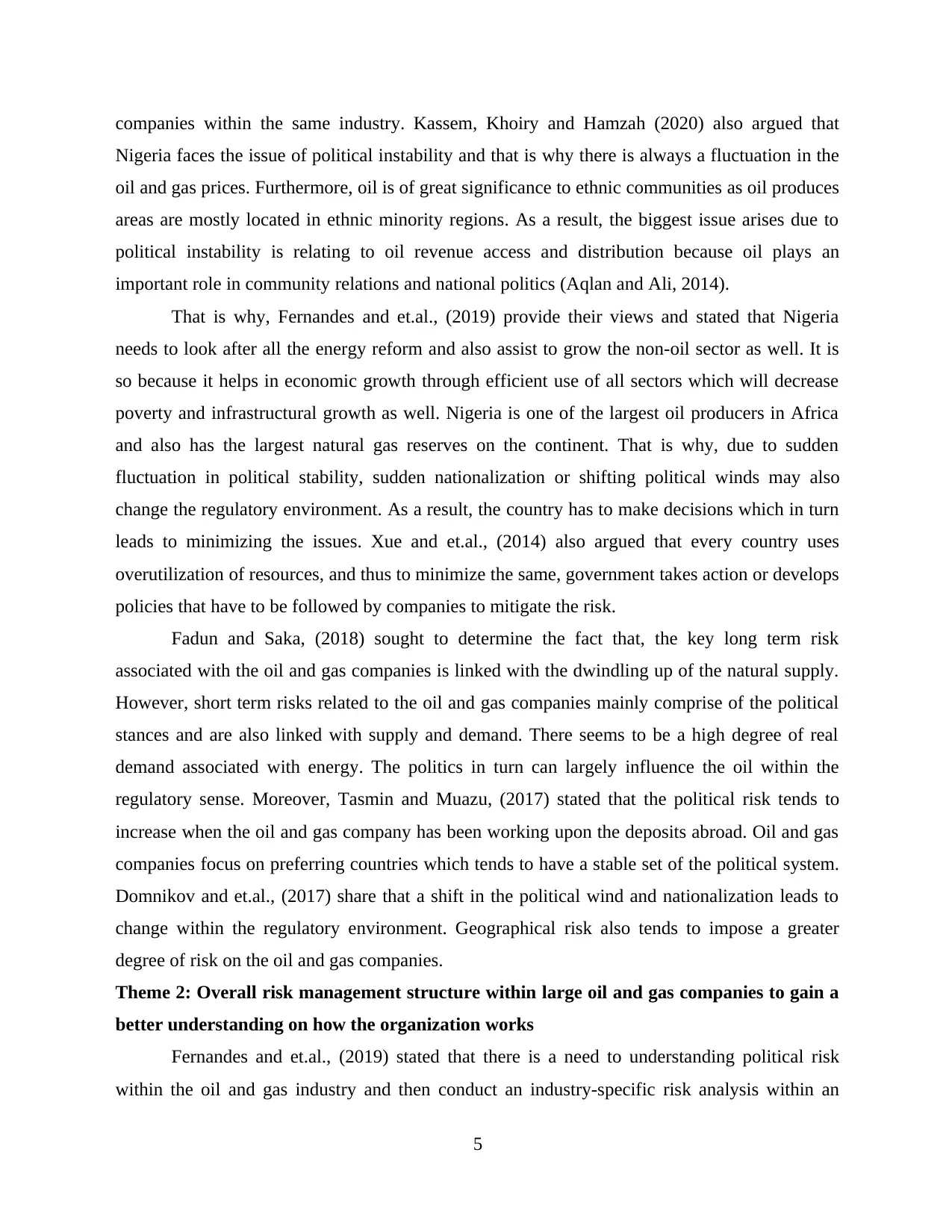
companies within the same industry. Kassem, Khoiry and Hamzah (2020) also argued that
Nigeria faces the issue of political instability and that is why there is always a fluctuation in the
oil and gas prices. Furthermore, oil is of great significance to ethnic communities as oil produces
areas are mostly located in ethnic minority regions. As a result, the biggest issue arises due to
political instability is relating to oil revenue access and distribution because oil plays an
important role in community relations and national politics (Aqlan and Ali, 2014).
That is why, Fernandes and et.al., (2019) provide their views and stated that Nigeria
needs to look after all the energy reform and also assist to grow the non-oil sector as well. It is
so because it helps in economic growth through efficient use of all sectors which will decrease
poverty and infrastructural growth as well. Nigeria is one of the largest oil producers in Africa
and also has the largest natural gas reserves on the continent. That is why, due to sudden
fluctuation in political stability, sudden nationalization or shifting political winds may also
change the regulatory environment. As a result, the country has to make decisions which in turn
leads to minimizing the issues. Xue and et.al., (2014) also argued that every country uses
overutilization of resources, and thus to minimize the same, government takes action or develops
policies that have to be followed by companies to mitigate the risk.
Fadun and Saka, (2018) sought to determine the fact that, the key long term risk
associated with the oil and gas companies is linked with the dwindling up of the natural supply.
However, short term risks related to the oil and gas companies mainly comprise of the political
stances and are also linked with supply and demand. There seems to be a high degree of real
demand associated with energy. The politics in turn can largely influence the oil within the
regulatory sense. Moreover, Tasmin and Muazu, (2017) stated that the political risk tends to
increase when the oil and gas company has been working upon the deposits abroad. Oil and gas
companies focus on preferring countries which tends to have a stable set of the political system.
Domnikov and et.al., (2017) share that a shift in the political wind and nationalization leads to
change within the regulatory environment. Geographical risk also tends to impose a greater
degree of risk on the oil and gas companies.
Theme 2: Overall risk management structure within large oil and gas companies to gain a
better understanding on how the organization works
Fernandes and et.al., (2019) stated that there is a need to understanding political risk
within the oil and gas industry and then conduct an industry-specific risk analysis within an
5
Nigeria faces the issue of political instability and that is why there is always a fluctuation in the
oil and gas prices. Furthermore, oil is of great significance to ethnic communities as oil produces
areas are mostly located in ethnic minority regions. As a result, the biggest issue arises due to
political instability is relating to oil revenue access and distribution because oil plays an
important role in community relations and national politics (Aqlan and Ali, 2014).
That is why, Fernandes and et.al., (2019) provide their views and stated that Nigeria
needs to look after all the energy reform and also assist to grow the non-oil sector as well. It is
so because it helps in economic growth through efficient use of all sectors which will decrease
poverty and infrastructural growth as well. Nigeria is one of the largest oil producers in Africa
and also has the largest natural gas reserves on the continent. That is why, due to sudden
fluctuation in political stability, sudden nationalization or shifting political winds may also
change the regulatory environment. As a result, the country has to make decisions which in turn
leads to minimizing the issues. Xue and et.al., (2014) also argued that every country uses
overutilization of resources, and thus to minimize the same, government takes action or develops
policies that have to be followed by companies to mitigate the risk.
Fadun and Saka, (2018) sought to determine the fact that, the key long term risk
associated with the oil and gas companies is linked with the dwindling up of the natural supply.
However, short term risks related to the oil and gas companies mainly comprise of the political
stances and are also linked with supply and demand. There seems to be a high degree of real
demand associated with energy. The politics in turn can largely influence the oil within the
regulatory sense. Moreover, Tasmin and Muazu, (2017) stated that the political risk tends to
increase when the oil and gas company has been working upon the deposits abroad. Oil and gas
companies focus on preferring countries which tends to have a stable set of the political system.
Domnikov and et.al., (2017) share that a shift in the political wind and nationalization leads to
change within the regulatory environment. Geographical risk also tends to impose a greater
degree of risk on the oil and gas companies.
Theme 2: Overall risk management structure within large oil and gas companies to gain a
better understanding on how the organization works
Fernandes and et.al., (2019) stated that there is a need to understanding political risk
within the oil and gas industry and then conduct an industry-specific risk analysis within an
5
⊘ This is a preview!⊘
Do you want full access?
Subscribe today to unlock all pages.

Trusted by 1+ million students worldwide
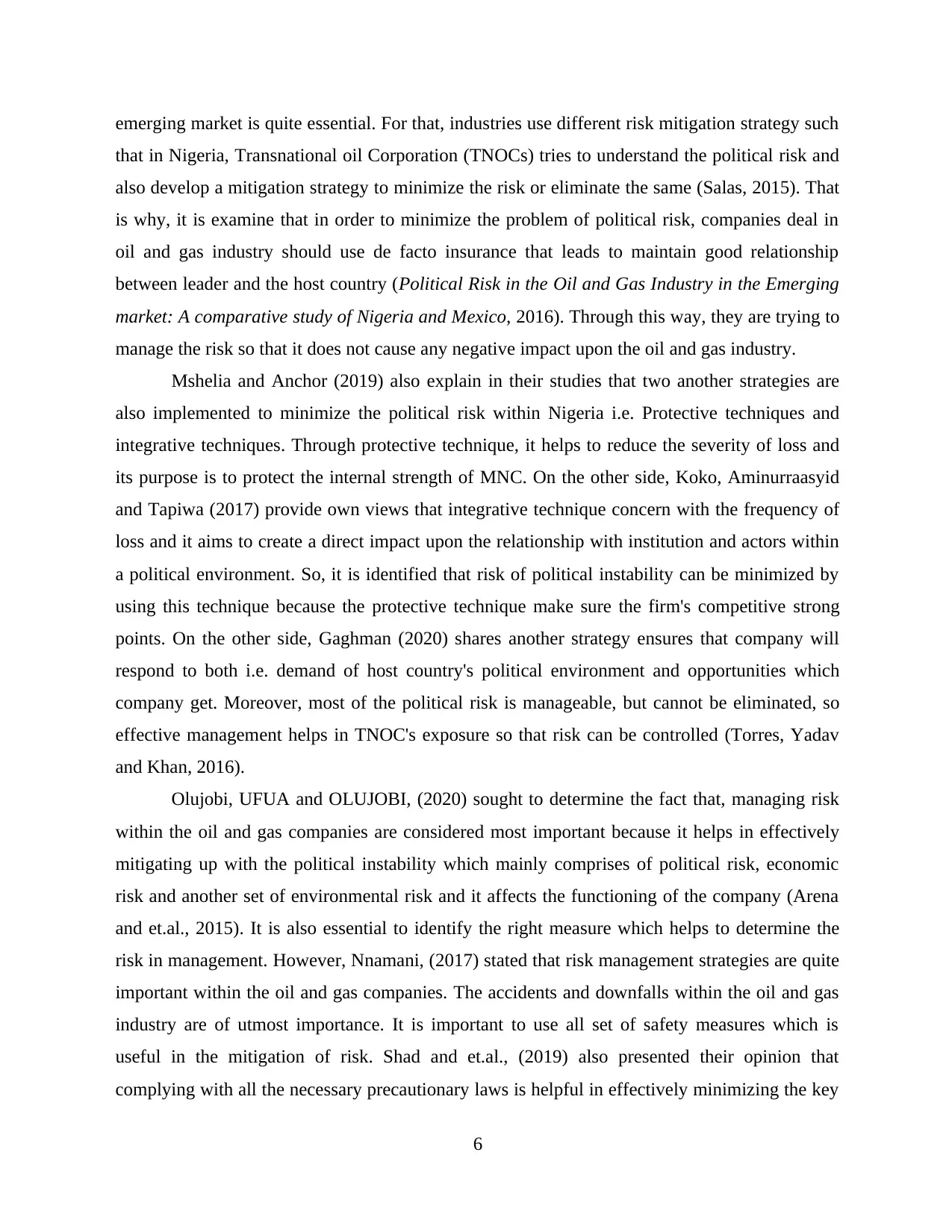
emerging market is quite essential. For that, industries use different risk mitigation strategy such
that in Nigeria, Transnational oil Corporation (TNOCs) tries to understand the political risk and
also develop a mitigation strategy to minimize the risk or eliminate the same (Salas, 2015). That
is why, it is examine that in order to minimize the problem of political risk, companies deal in
oil and gas industry should use de facto insurance that leads to maintain good relationship
between leader and the host country (Political Risk in the Oil and Gas Industry in the Emerging
market: A comparative study of Nigeria and Mexico, 2016). Through this way, they are trying to
manage the risk so that it does not cause any negative impact upon the oil and gas industry.
Mshelia and Anchor (2019) also explain in their studies that two another strategies are
also implemented to minimize the political risk within Nigeria i.e. Protective techniques and
integrative techniques. Through protective technique, it helps to reduce the severity of loss and
its purpose is to protect the internal strength of MNC. On the other side, Koko, Aminurraasyid
and Tapiwa (2017) provide own views that integrative technique concern with the frequency of
loss and it aims to create a direct impact upon the relationship with institution and actors within
a political environment. So, it is identified that risk of political instability can be minimized by
using this technique because the protective technique make sure the firm's competitive strong
points. On the other side, Gaghman (2020) shares another strategy ensures that company will
respond to both i.e. demand of host country's political environment and opportunities which
company get. Moreover, most of the political risk is manageable, but cannot be eliminated, so
effective management helps in TNOC's exposure so that risk can be controlled (Torres, Yadav
and Khan, 2016).
Olujobi, UFUA and OLUJOBI, (2020) sought to determine the fact that, managing risk
within the oil and gas companies are considered most important because it helps in effectively
mitigating up with the political instability which mainly comprises of political risk, economic
risk and another set of environmental risk and it affects the functioning of the company (Arena
and et.al., 2015). It is also essential to identify the right measure which helps to determine the
risk in management. However, Nnamani, (2017) stated that risk management strategies are quite
important within the oil and gas companies. The accidents and downfalls within the oil and gas
industry are of utmost importance. It is important to use all set of safety measures which is
useful in the mitigation of risk. Shad and et.al., (2019) also presented their opinion that
complying with all the necessary precautionary laws is helpful in effectively minimizing the key
6
that in Nigeria, Transnational oil Corporation (TNOCs) tries to understand the political risk and
also develop a mitigation strategy to minimize the risk or eliminate the same (Salas, 2015). That
is why, it is examine that in order to minimize the problem of political risk, companies deal in
oil and gas industry should use de facto insurance that leads to maintain good relationship
between leader and the host country (Political Risk in the Oil and Gas Industry in the Emerging
market: A comparative study of Nigeria and Mexico, 2016). Through this way, they are trying to
manage the risk so that it does not cause any negative impact upon the oil and gas industry.
Mshelia and Anchor (2019) also explain in their studies that two another strategies are
also implemented to minimize the political risk within Nigeria i.e. Protective techniques and
integrative techniques. Through protective technique, it helps to reduce the severity of loss and
its purpose is to protect the internal strength of MNC. On the other side, Koko, Aminurraasyid
and Tapiwa (2017) provide own views that integrative technique concern with the frequency of
loss and it aims to create a direct impact upon the relationship with institution and actors within
a political environment. So, it is identified that risk of political instability can be minimized by
using this technique because the protective technique make sure the firm's competitive strong
points. On the other side, Gaghman (2020) shares another strategy ensures that company will
respond to both i.e. demand of host country's political environment and opportunities which
company get. Moreover, most of the political risk is manageable, but cannot be eliminated, so
effective management helps in TNOC's exposure so that risk can be controlled (Torres, Yadav
and Khan, 2016).
Olujobi, UFUA and OLUJOBI, (2020) sought to determine the fact that, managing risk
within the oil and gas companies are considered most important because it helps in effectively
mitigating up with the political instability which mainly comprises of political risk, economic
risk and another set of environmental risk and it affects the functioning of the company (Arena
and et.al., 2015). It is also essential to identify the right measure which helps to determine the
risk in management. However, Nnamani, (2017) stated that risk management strategies are quite
important within the oil and gas companies. The accidents and downfalls within the oil and gas
industry are of utmost importance. It is important to use all set of safety measures which is
useful in the mitigation of risk. Shad and et.al., (2019) also presented their opinion that
complying with all the necessary precautionary laws is helpful in effectively minimizing the key
6
Paraphrase This Document
Need a fresh take? Get an instant paraphrase of this document with our AI Paraphraser
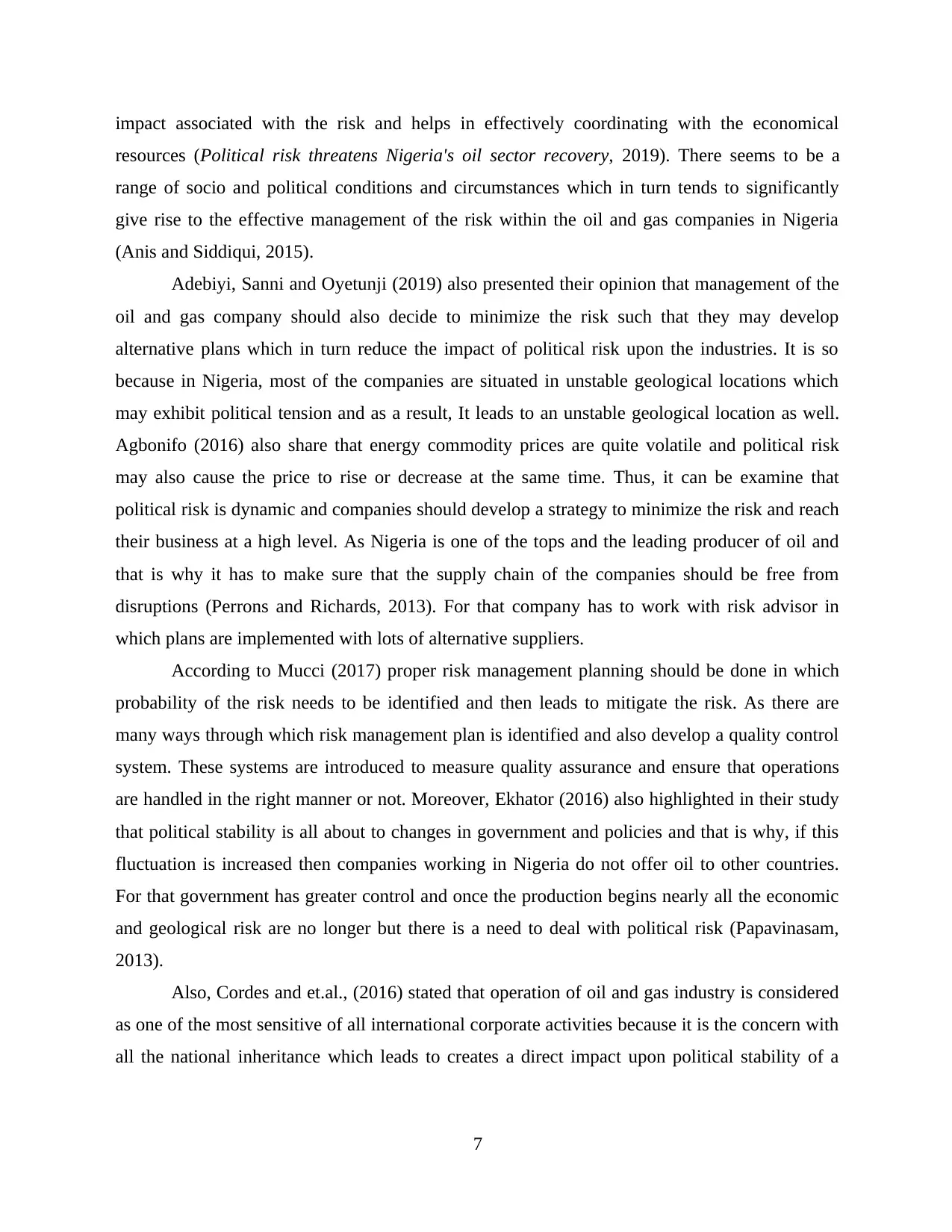
impact associated with the risk and helps in effectively coordinating with the economical
resources (Political risk threatens Nigeria's oil sector recovery, 2019). There seems to be a
range of socio and political conditions and circumstances which in turn tends to significantly
give rise to the effective management of the risk within the oil and gas companies in Nigeria
(Anis and Siddiqui, 2015).
Adebiyi, Sanni and Oyetunji (2019) also presented their opinion that management of the
oil and gas company should also decide to minimize the risk such that they may develop
alternative plans which in turn reduce the impact of political risk upon the industries. It is so
because in Nigeria, most of the companies are situated in unstable geological locations which
may exhibit political tension and as a result, It leads to an unstable geological location as well.
Agbonifo (2016) also share that energy commodity prices are quite volatile and political risk
may also cause the price to rise or decrease at the same time. Thus, it can be examine that
political risk is dynamic and companies should develop a strategy to minimize the risk and reach
their business at a high level. As Nigeria is one of the tops and the leading producer of oil and
that is why it has to make sure that the supply chain of the companies should be free from
disruptions (Perrons and Richards, 2013). For that company has to work with risk advisor in
which plans are implemented with lots of alternative suppliers.
According to Mucci (2017) proper risk management planning should be done in which
probability of the risk needs to be identified and then leads to mitigate the risk. As there are
many ways through which risk management plan is identified and also develop a quality control
system. These systems are introduced to measure quality assurance and ensure that operations
are handled in the right manner or not. Moreover, Ekhator (2016) also highlighted in their study
that political stability is all about to changes in government and policies and that is why, if this
fluctuation is increased then companies working in Nigeria do not offer oil to other countries.
For that government has greater control and once the production begins nearly all the economic
and geological risk are no longer but there is a need to deal with political risk (Papavinasam,
2013).
Also, Cordes and et.al., (2016) stated that operation of oil and gas industry is considered
as one of the most sensitive of all international corporate activities because it is the concern with
all the national inheritance which leads to creates a direct impact upon political stability of a
7
resources (Political risk threatens Nigeria's oil sector recovery, 2019). There seems to be a
range of socio and political conditions and circumstances which in turn tends to significantly
give rise to the effective management of the risk within the oil and gas companies in Nigeria
(Anis and Siddiqui, 2015).
Adebiyi, Sanni and Oyetunji (2019) also presented their opinion that management of the
oil and gas company should also decide to minimize the risk such that they may develop
alternative plans which in turn reduce the impact of political risk upon the industries. It is so
because in Nigeria, most of the companies are situated in unstable geological locations which
may exhibit political tension and as a result, It leads to an unstable geological location as well.
Agbonifo (2016) also share that energy commodity prices are quite volatile and political risk
may also cause the price to rise or decrease at the same time. Thus, it can be examine that
political risk is dynamic and companies should develop a strategy to minimize the risk and reach
their business at a high level. As Nigeria is one of the tops and the leading producer of oil and
that is why it has to make sure that the supply chain of the companies should be free from
disruptions (Perrons and Richards, 2013). For that company has to work with risk advisor in
which plans are implemented with lots of alternative suppliers.
According to Mucci (2017) proper risk management planning should be done in which
probability of the risk needs to be identified and then leads to mitigate the risk. As there are
many ways through which risk management plan is identified and also develop a quality control
system. These systems are introduced to measure quality assurance and ensure that operations
are handled in the right manner or not. Moreover, Ekhator (2016) also highlighted in their study
that political stability is all about to changes in government and policies and that is why, if this
fluctuation is increased then companies working in Nigeria do not offer oil to other countries.
For that government has greater control and once the production begins nearly all the economic
and geological risk are no longer but there is a need to deal with political risk (Papavinasam,
2013).
Also, Cordes and et.al., (2016) stated that operation of oil and gas industry is considered
as one of the most sensitive of all international corporate activities because it is the concern with
all the national inheritance which leads to creates a direct impact upon political stability of a
7
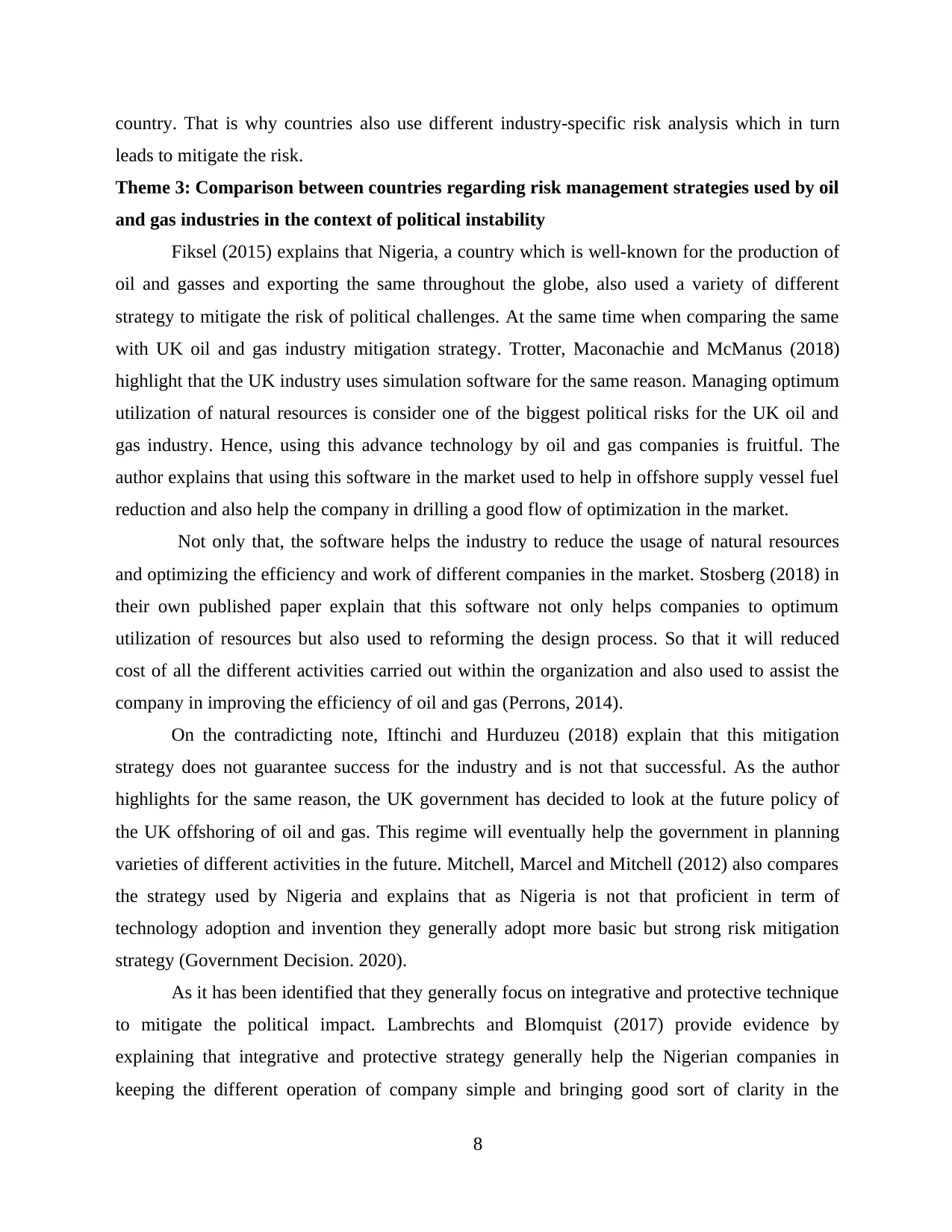
country. That is why countries also use different industry-specific risk analysis which in turn
leads to mitigate the risk.
Theme 3: Comparison between countries regarding risk management strategies used by oil
and gas industries in the context of political instability
Fiksel (2015) explains that Nigeria, a country which is well-known for the production of
oil and gasses and exporting the same throughout the globe, also used a variety of different
strategy to mitigate the risk of political challenges. At the same time when comparing the same
with UK oil and gas industry mitigation strategy. Trotter, Maconachie and McManus (2018)
highlight that the UK industry uses simulation software for the same reason. Managing optimum
utilization of natural resources is consider one of the biggest political risks for the UK oil and
gas industry. Hence, using this advance technology by oil and gas companies is fruitful. The
author explains that using this software in the market used to help in offshore supply vessel fuel
reduction and also help the company in drilling a good flow of optimization in the market.
Not only that, the software helps the industry to reduce the usage of natural resources
and optimizing the efficiency and work of different companies in the market. Stosberg (2018) in
their own published paper explain that this software not only helps companies to optimum
utilization of resources but also used to reforming the design process. So that it will reduced
cost of all the different activities carried out within the organization and also used to assist the
company in improving the efficiency of oil and gas (Perrons, 2014).
On the contradicting note, Iftinchi and Hurduzeu (2018) explain that this mitigation
strategy does not guarantee success for the industry and is not that successful. As the author
highlights for the same reason, the UK government has decided to look at the future policy of
the UK offshoring of oil and gas. This regime will eventually help the government in planning
varieties of different activities in the future. Mitchell, Marcel and Mitchell (2012) also compares
the strategy used by Nigeria and explains that as Nigeria is not that proficient in term of
technology adoption and invention they generally adopt more basic but strong risk mitigation
strategy (Government Decision. 2020).
As it has been identified that they generally focus on integrative and protective technique
to mitigate the political impact. Lambrechts and Blomquist (2017) provide evidence by
explaining that integrative and protective strategy generally help the Nigerian companies in
keeping the different operation of company simple and bringing good sort of clarity in the
8
leads to mitigate the risk.
Theme 3: Comparison between countries regarding risk management strategies used by oil
and gas industries in the context of political instability
Fiksel (2015) explains that Nigeria, a country which is well-known for the production of
oil and gasses and exporting the same throughout the globe, also used a variety of different
strategy to mitigate the risk of political challenges. At the same time when comparing the same
with UK oil and gas industry mitigation strategy. Trotter, Maconachie and McManus (2018)
highlight that the UK industry uses simulation software for the same reason. Managing optimum
utilization of natural resources is consider one of the biggest political risks for the UK oil and
gas industry. Hence, using this advance technology by oil and gas companies is fruitful. The
author explains that using this software in the market used to help in offshore supply vessel fuel
reduction and also help the company in drilling a good flow of optimization in the market.
Not only that, the software helps the industry to reduce the usage of natural resources
and optimizing the efficiency and work of different companies in the market. Stosberg (2018) in
their own published paper explain that this software not only helps companies to optimum
utilization of resources but also used to reforming the design process. So that it will reduced
cost of all the different activities carried out within the organization and also used to assist the
company in improving the efficiency of oil and gas (Perrons, 2014).
On the contradicting note, Iftinchi and Hurduzeu (2018) explain that this mitigation
strategy does not guarantee success for the industry and is not that successful. As the author
highlights for the same reason, the UK government has decided to look at the future policy of
the UK offshoring of oil and gas. This regime will eventually help the government in planning
varieties of different activities in the future. Mitchell, Marcel and Mitchell (2012) also compares
the strategy used by Nigeria and explains that as Nigeria is not that proficient in term of
technology adoption and invention they generally adopt more basic but strong risk mitigation
strategy (Government Decision. 2020).
As it has been identified that they generally focus on integrative and protective technique
to mitigate the political impact. Lambrechts and Blomquist (2017) provide evidence by
explaining that integrative and protective strategy generally help the Nigerian companies in
keeping the different operation of company simple and bringing good sort of clarity in the
8
⊘ This is a preview!⊘
Do you want full access?
Subscribe today to unlock all pages.

Trusted by 1+ million students worldwide
1 out of 44
Related Documents
Your All-in-One AI-Powered Toolkit for Academic Success.
+13062052269
info@desklib.com
Available 24*7 on WhatsApp / Email
![[object Object]](/_next/static/media/star-bottom.7253800d.svg)
Unlock your academic potential
Copyright © 2020–2026 A2Z Services. All Rights Reserved. Developed and managed by ZUCOL.





